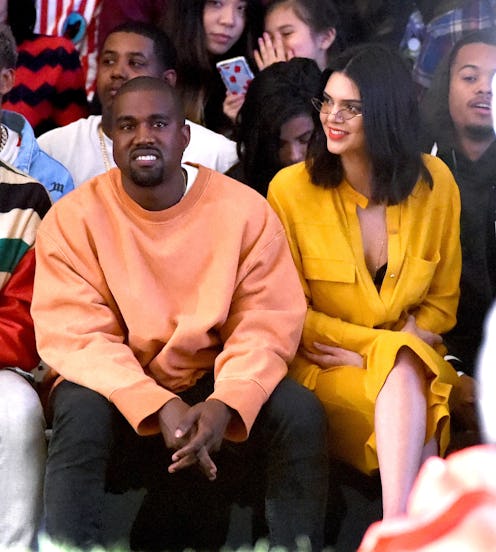Entertainment
Kanye Proves 2016 Changed Everything For Albums
Let's remember this year for one key moment in music history: 2016 is the year the album as we once knew it died. Kanye West added "Saint Pablo" to The Life of Pablo on Tuesday, June 14, and this new development is just one of many updates he has made to the work since its debut on Tidal back in February. But Kanye is defiant about anyone who might interpret this as him dropping an album before it was ready to see the light of day, arguing via Twitter that this is more than an album, it's "#contemporaryart." And he isn't alone in taking this stance this year. More and more popular artists seem reluctant to release anything as simple as just an album; prime examples of this fact are Rihanna's Anti, Beyonce's video-art project Lemonade, and SBTRKT's self-described "non-album" Save Yourself.
Kanye has once again taken The Life of Pablo down off Tidal in order so it can be "refreshed," according to Entertainment Weekly. Their source also states it will be back up "shortly" (see link above). This is business as usual for West, who has been making edits to the published album since its debut, like in March when he changed elements of the production of the album and added Vic Mensa and Sia to "Wolves." His #contemporaryart is helping to redefine the way artists put out their music in 2016, but he's not the only one.
Rihanna set the experimental tone for the year when she released Anti on January 28. It had been the longest the vocalist had ever left between albums; her previous album, Unapologetic, had been released all the way back in 2013, and up until then, with the exception of 2008, Rihanna had released an album every year between 2005 and 20012. The anticipation for Rihanna's next project had reached fever pitch by early 2016. Which makes it all the more striking that after the handling of the surprise-release of the record, in which Tidal uploaded it early by mistake and then deleted it, Rihanna decided to trump their lack of fanfare by giving it away for free, tweeting the download code.
But it wasn't just its unorthodox release that made the album so different from its predecessors. It swerved the melodic pop songs Rihanna made her name on, and replaced these with a defiant mishmash of different genres, from music hall to rap to ballads. It was everything we didn't know we could expect from the artist: introverted, quieter music. Rihanna made it OK to be one of the biggest stars in pop, wait three years, and then — anticipating Kanye — to drop an album that felt rough around the edges and deliberately unfinished.
Then, in March, electronic artist SBTRKT released what he defined as a "not an album," Save Yourself. It was released as a conceptual art project on www.saveyourself.tv and was accompanied by animation and a smart, nuanced statement on what it might mean to avoid releasing an album:
This record was written from last summer til last week and is about being able to share music with you more frequently than I have done in the past, and not long after its been created...Culturally, albums now feel like a means to prove you are a "real" artist. To release an album, you turn yourself over to traditional label cycles and the end of increasing sales, leaving behind the creative spirit that brought the music to life in the first place.
So it wasn't just created as "not an album" for means of getting the music to fans faster, but as a political statement: to subvert the narrative of music-for-commercial-purposes. So far, so indie. But SBTRKT's album would be in line with some of the biggest releases of the year in its attempt to redefine how music reached fans.
By which, of course, I'm referring to the musical release of the year so far. The one your friends, your colleagues and the press won't stop talking about: Lemonade. If you've got breath in your body, you probably have an opinion on this release, because when have you ever seen anything like this before in pop music history?
Beyoncé released the album with limited publicity (a short video teaser a week before the debut), accompanied by a fifty-eight minute film on HBO . It featured both her music, and adapted poetry-prose from British-Somali poet Warsan Shire, and was both intensely personal (prompting speculation that the cheating husband in the piece was Jay Z) and political (addressing the Black Lives Matter movement) all at once. But it wasn't just the medium; it was the music. Pitchfork reported: "Via the album’s highly specific samples and features by artists like Jack White and James Blake, Lemonade proves Beyoncé to also be a new kind of post-genre pop star."
Much like Rihanna earlier in the year, Beyonce had proved that it didn't matter if you'd made your name as a pop star. If you were big enough, you could still make songs with whoever the f*ck you wanted to.
Which brings us neatly back to Kanye. His vision of an album as a "living breathing changing creative expression" isn't just a bold one: it allows for more flexibility in terms of his collaborations as he cuts artists like Sia and Vic Mensa out of the songs and adds them back in at whim. Honestly, The Life As Pablo may never be finished and that's wonderful. Whether or not the album functions for you as contemporary art, if you're a Kanye fan, you probably want to know what's inside his head: and what's a better insight into the daily moods and whims of rap's foremost genius than his album edits.
